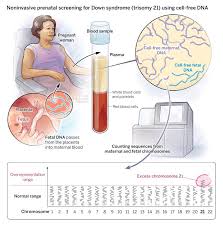
Noninvasive Prenatal Paternity Test: What You Need to Know
Noninvasive prenatal paternity testing is a method used to determine the biological father of an unborn child without invasive procedures such as amniocentesis or chorionic villus sampling (CVS). This type of test analyzes cell-free fetal DNA circulating in the mother’s blood during pregnancy.
How Does It Work?
During pregnancy, a small amount of the baby’s DNA is present in the mother’s bloodstream. Noninvasive prenatal paternity testing isolates and analyzes this fetal DNA to determine paternity. The test compares the genetic markers of the alleged father with those of the fetus to establish a biological relationship.
Benefits of Noninvasive Prenatal Paternity Testing
- Safe: Unlike invasive procedures, noninvasive prenatal paternity testing poses no risk to the mother or the fetus.
- Early Detection: The test can be performed as early as 8 weeks into pregnancy, providing early peace of mind for parents.
- Accuracy: Noninvasive prenatal paternity testing has a high accuracy rate, making it a reliable method for determining paternity.
- No Risk of Miscarriage: Since it does not involve invasive techniques, there is no risk of miscarriage associated with this type of test.
Considerations
While noninvasive prenatal paternity testing offers many benefits, it is important to consider certain factors before undergoing the test. It is crucial to consult with a healthcare provider or a genetic counselor to fully understand the implications and limitations of the results. Additionally, legal considerations regarding paternity establishment should be taken into account.
Conclusion
Noninvasive prenatal paternity testing provides an alternative method for determining paternity during pregnancy without posing risks to the mother or fetus. It offers early and accurate results, allowing parents to prepare for their child’s arrival with clarity and peace of mind.
Understanding Non-Invasive Prenatal Paternity Testing: Key Questions Answered
- Can you get a non-invasive DNA paternity test while pregnant?
- How accurate is non-invasive prenatal paternity testing?
- Can NIPT be used to determine paternity?
- How can I find out the father of my unborn child without DNA?
Can you get a non-invasive DNA paternity test while pregnant?
Yes, it is possible to get a non-invasive DNA paternity test while pregnant. Non-invasive prenatal paternity testing analyzes cell-free fetal DNA circulating in the mother’s bloodstream to determine the biological father of the unborn child. This method is safe for both the mother and the fetus, as it does not involve any invasive procedures that could pose a risk of miscarriage. The test can typically be performed as early as 8 weeks into pregnancy, providing expectant parents with an early opportunity to establish paternity with a high level of accuracy and peace of mind. It is important to consult with a healthcare provider or genetic counselor before undergoing this test to fully understand its implications and ensure proper interpretation of the results.
How accurate is non-invasive prenatal paternity testing?
Noninvasive prenatal paternity testing is known for its high level of accuracy. The test compares the genetic markers of the alleged father with those of the fetus, utilizing cell-free fetal DNA circulating in the mother’s bloodstream. Studies have shown that noninvasive prenatal paternity testing has a high accuracy rate, making it a reliable method for determining paternity before the child is born. However, it is important to note that while the test is highly accurate, consulting with a healthcare provider or genetic counselor can provide further insight into the test’s limitations and implications.
Can NIPT be used to determine paternity?
Noninvasive prenatal testing (NIPT) is primarily designed to screen for genetic conditions in the fetus, such as Down syndrome and other chromosomal abnormalities. While NIPT analyzes cell-free fetal DNA in the mother’s bloodstream, it is not specifically intended for paternity testing. However, there are specialized noninvasive prenatal paternity tests available that specifically focus on determining the biological father of the unborn child by comparing the genetic markers of the alleged father with those of the fetus. It is important to consult with a healthcare provider or a genetic counselor to understand the specific capabilities and limitations of different types of noninvasive prenatal tests for paternity determination.
How can I find out the father of my unborn child without DNA?
Determining the father of an unborn child without DNA testing is not scientifically possible. Noninvasive prenatal paternity testing relies on analyzing cell-free fetal DNA in the mother’s blood to establish paternity accurately. While there are other methods, such as old wives’ tales or myths, that claim to predict paternity without DNA, they lack scientific validity and reliability. For accurate and conclusive results, DNA testing remains the most reliable method to determine the biological father of an unborn child.
